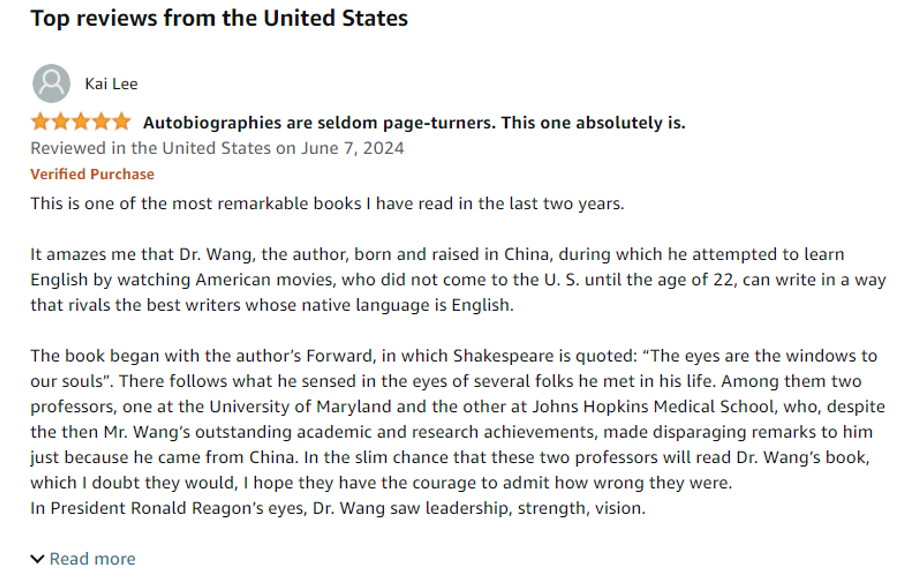From Darkness to Sight
- kaifong5
- Jun 7, 2024
- 3 min read
Updated: Jun 8, 2024
Autobiographies are seldom page-turners. This one absolutely is.
5 stars out of 5 stars
This is one of the most remarkable books I have read in the last two years.
It amazes me that Dr. Wang, the author, born and raised in China, during which he attempted to learn English by watching American movies, who did not come to the U. S. until the age of 22, can write in a way that rivals the best writers whose native language is English.
The book began with the author’s Forward, in which Shakespeare is quoted: “The eyes are the windows to our souls”. There follows what he sensed in the eyes of several folks he met in his life. Among them two professors, one at the University of Maryland and the other at Johns Hopkins Medical School, who, despite the then Mr. Wang’s outstanding academic and research achievements, made disparaging remarks to him just because he came from China. In the slim chance that these two professors will read Dr. Wang’s book, which I doubt they would, I hope they have the courage to admit how wrong they were.
In President Ronald Reagon’s eyes, Dr. Wang saw leadership, strength, vision.
Chapter 1, entitled Maria, Part 1, introduces the reader to a fifteen-year-old girl named Maria from an orphanage in Moldova in Eastern Europe. Maria could not see as far back as she could remember. She resembled a young Audrey Hepburn, but she had never seen her own face. Through the kindness of a missionary couple, she was brought to the United States and referred to Dr. Wang, in the hope that Dr. Wang could restore her vision, bringing her from darkness to sight. Part 1 ends when the surgery was about to begin, and the story of Maria does not resume until the last Chapter, Maria, Part 2. In between was the autobiography of Dr. Wang, consisting of 19 chapters. However, I believe that most readers would jump to Chapter 21 to find out whether Maria’s vision was restored, before going back to Chapters 2 to learn the remarkable life of Dr. Wang.
Dr. Wang tells his experience of growing up in China during the Cultural Revolution, how his high school education was cutoff, and he faced deportation to the countryside to a life of poverty and misery. He was saved from this fate when Mao died on September 9, 1976. By sheer hard work and determination, he was able, in a few months, to catch up the materials in two missing high school grades and scored top marks in the college entrance examination. This earned him the acceptance to The University of Science and Technology in China. Being a top student there on graduation, he was selected to come to the U.S. for graduate studies, first obtaining a PhD in laser physics at the University of Maryland, subsequently a M.D. from the Harvard/MIT HST program. He has become a world-renowned laser eye surgeon.
Particularly moving and inspiring are the chapters on several patients whose vision he restored..
The chapter “Gwen” was sad to read. It tells Dr. Wang’s five year friendship with Gwen, an American girl. Although they fell in love and wanted to get married, it did not materialize because Gwen’s mother simply did not approve of her daughter marrying someone who was from China.
Dr. Wang wrote about his journey from an atheist to a Christian. During his eye restoration surgeries on patients whose eyes were so damaged that restoration of sight seemed beyond human capabilities, he prayed to God for help. It was his belief that only through God’s intervention that he was able to successfully carry out these surgeries.
Before becoming a Christian, Dr. Wang searched hard for answers to questions such as What is the meaning of life? Is there an all powerful God? Dr. Wang is to be congratulated that he found the answers in the Bible and from his personal experience.
In conclusion, I think Dr. Wang would enlighten many of us if he would care to comment on the following remarks, two by the composer Gustav Mahler and the other by Charles Darwin:
Mahler: “How a world so fresh and beautiful contain so much cruelty?”
“How can cruelty and evil be the work of a loving God?”
Paul Johnson in his biography of “Darwin”:
“Charles Dawin thought the doctrine of everlasting punishment not only untrue but positively evil”
Link to Amazon Review:


Comments